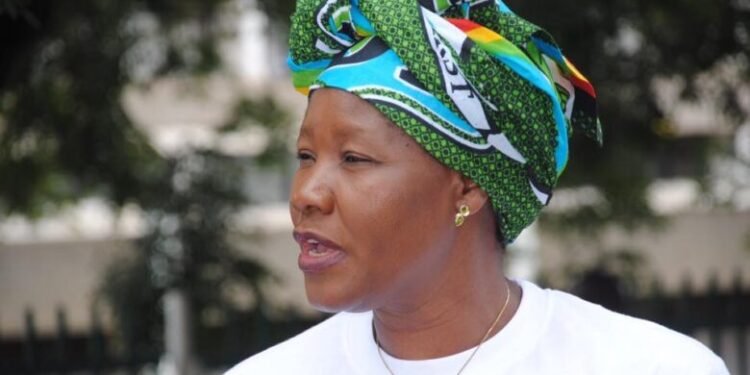Edith Zewelanji Nawakwi: Fearless future president gone too soon
WHILE the South African political landscape that led to the emergence of democracy in the formerly white-led apartheid nation produced Winnie Mandela, the political rebirth here at home gave the country Edith Zewelanji Nawakwi, who died on April 7, 2025.
Winnie formerly, wife of first president of free South Africa, Nelson Mandela, was humiliated, according to Economic Freedom Fighters (EFF) leader Julius Malema who spoke at her funeral, by a political system that she helped craft as an icon of the freedom struggle in that country.
Nawakwi, on her part was not only humiliated but traumatised by a similar system that was born out of a struggle she participated in moulding that ended Zambia’s one-party state, effectively cutting down President Kaunda’s 27-year rule.
Thanks to social media, unlike humans, the internet does not forget. Since her death videos are emerging in some of which she explains how police attempted to arrest her while being attended to at the University Teaching Hospital (UTH) in Lusaka. How Zambia’s court system was attempting to move sessions to her house because those pursuing her believed she was faking illness as a way to evade appearing in court. Yet evidently by all purposes Nawakwi was unwell and had in the past travelled to India for specialist treatment.
In this regard one cannot take away the common attribute Nawakwi and Winnie shared. They were strong women the continent badly needed and still needs in a quest to build a strong democracy that will protect Africa and foster a fair justice system, rule of law, enjoyment of free speech and other democratic values.
Whichever hat she wore, Nawakwi was a brave human being. Intelligent, fearless, resolute, confident, articulate and above all knowledgeable in whatever subject she discussed.
In politics she was a reliable partner you could count on to wage battle and win or defeated together. But if she was on the opposite side then you faced an uphill battle. As an opposition leader she remained a pricking pain in the ribs of those in power. She made her opponents emerge incompetent, weak and vulnerable.
The reason was simple: before she tackled you she researched picking facts that whenever in a conversation with her and you were not sharp enough you would look like a toddler from a nursery school.
I met Nawakwi while she was at Kasama Girls Secondary School. I had been covering a UNIP provincial conference which was opened by President Kaunda. During recess, I sneaked out to the school to check on a cousin who was there. Nawakwi was in my cousin’s group. Next I met her twice or so while she was a student at the University of Zambian in Lusaka.
After university she joined government, I presume the Ministry of Energy, and lived at a block of flats on Church Road almost opposite the Zambia National Service headquarters. My younger brother lived a few flats away from Nawakwi’s.
Even as a government employee, she took part in the activities that gave birth to the Movement for Multiparty Democracy (MMD). In short, without fear of losing her job she joined an insurrection to remove Kaunda, who was her employer.
When MMD formed government she was appointed minister of state. When Ronald Penza was dropped as minister of finance, she took over from him making her the first female finance minister, an accolade she enjoyed at the regional level.
When Chiluba schemed his intention to go for the third term, he was shocked that Nawakwi was among those who rebelled to oppose the evil intention. As Chiluba persisted, she and others left Cabinet and the MMD to form the Forum for Democracy and Development (FDD), then headed by former vice president General Christon Tembo.
After Gen Tembo died she leaped to the helm of the FDD as head. As an opposition leader her attributes were visible for all to see, among them her effectiveness as a grassroots campaigner. She moulded the FDD into a formidable force.
In 2009, I attended a conference with her in Tripoli, Libya, on the lobby to promote the United States of Africa, then championed by Western-slain Muammar Ghadaffi. She spoke at the gathering, as always drawing applause and accollades.
In all fairness Nawakwi had developed into a possible future female president of Zambia. Maybe that is what made her detractors uncomfortable. Her ability to connect with everybody was highly impressive. She articulated issues so authoritatively that in most cases it became difficult not to agree with her.
Other than that, she was truly a mother to lean one’s shoulder on, a good and in her own way humble human being. To her political colleagues and competitors she was a fearless advocate of the truth and always strove to stand on the side if the truth.
She was a woman among women and a man among men. She will be greatly missed. But what will help is for former terminators not to shed crocodile tears. Zambians will not agree with your cosmetic grief. Her second name Zewelanji, in Namwanga, means celebration. She will thus be celebrated for her efforts to create a better Zambia for all. She may go away but her legacy will live on. Many will be inspired by her fearlessness, bravery and resilience. To some of her followers her death is not distant from emotional murder. Go well Zewelanji.
Hicks Sikazwe is author of Zambia’s Fall Back Presidents, Wasted Years and Voters in Shadows. He is former Deputy Ediyor in Chief of Times of Zambia, now Communications and Media Affairs Advocate based in Ndola. Comments 0955/0966929611 or hpsikazwe@gmail.com

























